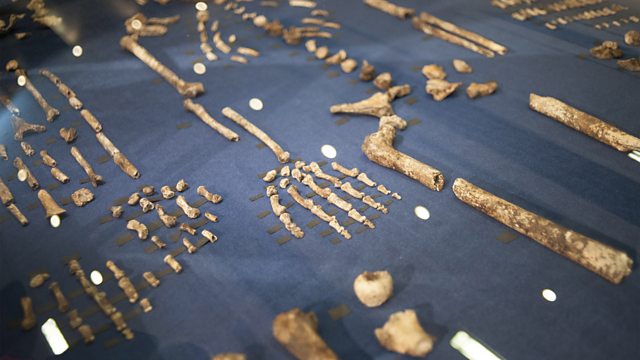New Human Found in the ‘Cradle of Humankind' Cave
Partial skeletons of new human found in Africa cave, Sperm whale dialects demonstrate culture, Toxic mercury cycling in sea creatures.
A very deep, hard to access, cave in the Rising Star cave system in South Africa has yielded a massive and important haul of fossilised early human bones. The bones have been assembled into 15 partial skeletons, of what have been called Homo Naledi – a new hominin species, which could either be one of the earliest Homo species and a precursor to modern humans. Or it could be like the Hobbit - Homo floresiensis, a redundant branch on the human evolutionary tree. The bones have yet to be dated, but the anthropological features suggest a small-brained, human-like creature. The most intriguing thing is where they were found and why in such numbers? Some think it could be a burial chamber and if these Naledis are very ancient, this could be one of the earliest examples of ritualistic behaviour in humans.
Whale Culture
It used to be thought that the thing that made humans so special was that we had language and culture. But more and more examples of possible ‘culture’ in animals is being discovered. When we talk about culture we mean – it is something, such as a behaviour, that is socially learned and that it is a group behaviour. We know that whales are social and vocal creatures, so it stands to reason that scientists at Dalhousie University in Canada would want to see if they exhibit some form of culture. They studied large groups of female Sperm whales and found that even those that were unrelated in the group used the same patterns of calls. Similar to dialects in human language, different groups of whales used different patterns of clicks, or codas, to communicate things like where food is or look out for predators and to bond with each other. Clever modelling has ruled out any genetic or geographical reasons for the shared language, which leaves a form of cultural learning as the obvious reason.
Toxic Mercury Cycling in Sea Creatures
It has long been known that heavy metals, such as mercury are very difficult to get rid of once they enter the marine ecosystem. They are ‘biomagnified’ or ‘bio-accumulate’ up the food chain. Mercury typically starts out from man-made processes like coal burning or mining, or naturally from forest fires. It is rapidly converted to a toxic organic compound - methyl mercury - by bacteria in the environment. From this, the mercury then gets into the food chain, so the microscopic zooplankton have tiny amounts of the neurotoxin, but they are eaten in quantity by the little fish, increasing the concentration of the metal, which is stored in the body. Then the bigger fish eat the little fish and the pattern continues right up to the top ocean predators like swordfish, sharks, seals and sea lions. And because it is a toxin it is an issue for us and other animals when it is eaten. Through this fascinating process, the concentration of mercury can be biomagnified 1–10 million fold. But a new study in the journal PNAS this week shows that the route of the poisonous Mercury is not just bottom up, it is top down as well. Hair moulted off in huge quantities by colonies of seals, could be returning the mercury back into the marine ecosystem.
(Photo caption: The skeleton of Homo naledi, a newly discovered human ancestor is displayed during the unveiling of the discovery on September 10, 2015 in Maropeng © Stefan Heunis/AFP/Getty Images)
Presenter: Jack Stewart
Producer: Fiona Roberts
Last on
More episodes
Previous
Broadcasts
- Thu 10 Sep 2015 18:32GMTÂ鶹ԼÅÄ World Service except East and Southern Africa & West and Central Africa
- Thu 10 Sep 2015 19:32GMTÂ鶹ԼÅÄ World Service East and Southern Africa & West and Central Africa only
- Thu 10 Sep 2015 23:32GMTÂ鶹ԼÅÄ World Service
- Fri 11 Sep 2015 02:32GMTÂ鶹ԼÅÄ World Service Europe and the Middle East & Australasia only
- Fri 11 Sep 2015 04:32GMTÂ鶹ԼÅÄ World Service Online, South Asia, UK DAB/Freeview & Americas and the Caribbean only
- Fri 11 Sep 2015 05:32GMTÂ鶹ԼÅÄ World Service East Asia
- Fri 11 Sep 2015 06:32GMTÂ鶹ԼÅÄ World Service Europe and the Middle East
- Fri 11 Sep 2015 12:32GMTÂ鶹ԼÅÄ World Service except Americas and the Caribbean & Australasia
- Fri 11 Sep 2015 13:32GMTÂ鶹ԼÅÄ World Service Australasia
Podcast
-
![]()
Science In Action
The Â鶹ԼÅÄ brings you all the week's science news.


